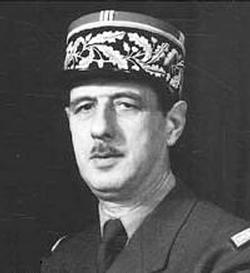DE GAULLE, CHARLES (1890–1970)

De Gaulle served as a junior officer during World War I, being wounded and taken prisoner by the Germans during the Battle of Verdun in 1916. During the interwar years he was on the staff of the Supreme War Council, authored several books on military subjects, and lectured at the French War College, working closely with the “Hero of Verdun,” Marshal Philippe Pétain, until the two men had a falling out in 1938.
After Nazi Germany invaded the Low Countries, Belgium, and France on May 10, 1940, Col. de Gaulle assumed command of the recently formed, hardly combat-ready French 4th Armored Division. The division showed some spunk at the strategic village of Montcornet near the Belgian border, when its tanks attacked German infantry, forcing the Germans to retreat, only to be driven off again due to lack of support and the intervention of the Luftwaffe. For this he was promoted to brigadier general. On June 6 French prime minister Paul Reynaud appointed de Gaulle undersecretary for war. However, with the defense of France all but a lost cause, de Gaulle went into British exile on June 17, the day Marshal Petain ousted Reynaud and began seeking an armistice with Germany. The next day de Gaulle used the services of the BBC in London to broadcast his “Appeal of 18 June” (Appel du 18 Juin) to the French people, saying, “The flame of French resistance must not and shall not die!” On August 2, 1940, a Vichy French court martial sentenced de Gaulle to death.
De Gaulle commanded the Free French Forces during the war, leading the fight against Axis and Vichy French troops on battlefronts everywhere from the Middle East to Indochina to West Africa and North Africa. In Algeria in June 1943, he and Henri Giraud established the French Committee of National Liberation (FCNL). On May 26, 1944, just days before the Allied landings in Normandy (Operation Overlord), de Gaulle announced that the FCNL was to be known as the Provisional Government of the French Republic. This announcement infuriated President Franklin D. Roosevelt and British Prime Minister Winston Churchill, who froze the increasingly haughty, immensely self-assured de Gaulle from the planning of Overlord. Numbering 400,000 men, the Free French participated in the Normandy landings and the invasion of southern France (Operation Dragoon), eventually leading the drive on Paris.
De Gaulle left Algiers for France on June 13, 1944, and his triumph was sealed when he walked through the center of the French capital to widespread popular acclaim. The next month, prodded by many Allied nations, the Americans and British agreed that de Gaulle could help administer the liberated portions of France. The following year, on November 13, 1945, the first postwar Constituent Assembly unanimously elected de Gaulle as head of the French government.
![]()
Liberation of Paris, August 1944: Gen. Charles de Gaulle’s Triumphal Return
![]()

 History buffs, there is good news! The Daily Chronicles of World War II is now available as an ebook for $4.99 on Amazon.com. Containing a year’s worth of dated entries from this website, the ebook brings the story of this tumultuous era to life in a compelling, authoritative, and succinct manner. Featuring inventive navigation aids, the ebook enables readers to instantly move forward or backward by month and date to different dated entries. Simple and elegant! Click
History buffs, there is good news! The Daily Chronicles of World War II is now available as an ebook for $4.99 on Amazon.com. Containing a year’s worth of dated entries from this website, the ebook brings the story of this tumultuous era to life in a compelling, authoritative, and succinct manner. Featuring inventive navigation aids, the ebook enables readers to instantly move forward or backward by month and date to different dated entries. Simple and elegant! Click 











